Interested in becoming an Organic Inspector?
Watch “Become an Organic Inspector” used by the USDA National Organic Program to recruit new inspectors and raise awareness about the inspection profession.
Preparation and Self-Assessment
IOIA encourages new inspectors to visit with certification agencies active in their area, as well as working inspectors who are willing to provide mentoring through apprenticeship. Contact information for certification agencies and working inspectors is available in the searchable on-line IOIA Member Directory.
IOIA is not an employment service and does not arrange work for inspectors. Rather, it is an association of professional inspectors which strives to provide support services for inspectors, build community among its members, and offer an opportunity for collective voice in industry issues.
Familiarize yourself with the acceptance criteria for the basic courses (Crop, Livestock, Processing). Additional preparation may be gained before attempting a course through training including webinars, conferences, and reading. Evaluate your unique skills, abilities, and interests in relation to the requirements for inspectors.
Like all professions, work as an inspector can be equally challenging and rewarding.
Inspection usually involves travel and long work days while doing inspections, with periods of intense report writing to meet critical deadlines, and potentially periods of no inspection work. Clear writing skills and the ability to meet deadlines are essential. The product by which an inspector is measured is, to a large degree, the report. Inspection work can be challenging, especially when fraud or negligence is uncovered.
Good questions to ask yourself before investing in training are:
- Do you have the integrity to do the job diligently?
- Are you familiar with organic standards and principles?
- Do you have good oral and written communications skills?
- Do you have math and accounting skills?
- Are you committed to ongoing professional upgrading as needed?
If so, Organic Inspecting may be a career opportunity for you.
Basic Training (Crop, Livestock, Processing)
Many certification agencies require basic IOIA training. The basic courses are rigorous, typically 4.5 days with some evening sessions.
Prior to basic training, a prerequisite standards course must be completed through webinar or self-directed learning.
Participants are sent an acceptance package four to six weeks before the course and should allow several days to complete pre-course reading and assignments. Completed pre-course assignments must be emailed to IOIA according to deadlines.
The IFOAM/IOIA International Organic Inspection Manual and the regional organic standards are the basis for the courses. Copies of the Manual and the standards are included in the registration fee.
Letters of Participation are awarded for those who choose to audit the course (test and written assignments not required of persons who audit courses) and those who fail to meet the course completion requirements.
Certificates of Completion are awarded to those who meet acceptance criteria, attend all sessions, and receive passing grades on the required written assignments and tests.
Training is open to non-members and members.
Both inspector and supporting members receive discounts off training fees. Join IOIA Now!
Scholarships are available
IOIA accepts applications for these annual scholarships, which provides full tuition for an IOIA-sponsored organic inspector training course during the following year:
- Andrew Rutherford Scholarship Award Both prospective and experienced inspectors are eligible to apply for the Rutherford Scholarship.
- The Organic Community Initiative Scholarship Open to applicants from outside the US/Canada who have the potential to develop organic in their region.
- The Reynaldo De la Rosa Memorial Scholarship Designated for Spanish-speaking recipients living and inspecting in Mexico.
These are awarded to individuals on the basis of potential as judged by the IOIA Scholarship Committee.
Applicants can choose to attend any IOIA-sponsored training. The Scholarship pays for tuition, room and board but does not cover transportation or other expenses.
Apprenticeship
Please see this page for the latest information on new apprenticeship opportunities. We keep the material below available for a general overview of the process.
IOIA has offered a variety of apprenticeship opportunities for organic inspectors, including field training, apprenticeship intensives, and one-on-one mentoring.
Some type of apprenticeship in each category (Crops, Livestock, and Processing) is recommended before seeking work of that category. Prospective inspectors should contact individual agencies for more information.
6 Basic Steps to Becoming a Professional Inspector
- Successful completion of IOIA inspector training, including the relevant standards.
- Accompany experienced inspector (mentor) on 1-3 inspections, writing reports for the 2nd and 3rd inspections for review by the mentor.
- Submit additional inspection reports for review and evaluation by the mentor.
- Mentors evaluate the work of the apprentice and may write a Recommendation Letter.
- Inspectors seek work from certifiers. Certifiers will typically require proof of training; a fee schedule; and conflict of interest and confidentiality agreements.
- Continuing education (both organic and non-organic) annually in the category. This should include 200-level training in the category (Crop, Livestock, Processing) through IOIA webinars. It might also include Advanced 300-level Training. IOIA provides 300-level training annually at the Annual Meeting, at several other locations during the year, and by webinar. Certificates are awarded to participants who complete all course requirements.
- IOIA Inspector Membership is strongly encouraged, including submitting the IOIA Training Verification Form after either 5 supervised inspections or 10 inspections for a certifier.
- IOIA Inspector Credentialing
Accreditation
IOIA offers inspector accreditation for members in 3 categories: Crops, Livestock, and Processing.
Applicants must meet minimum criteria in the following categories:
- Commitment to organics
- Education, Work and life experience
- Inspection experience (at least 2 years and 10 inspections)
- Continuing education
Additional criteria are the requirement to submit a current resume and evaluation letters from all the certifiers for which they have worked, plus attending inspector training at least every 3 years. Once accredited, applicants may apply for renewal every 3 years, again meeting minimum criteria of ongoing inspector training, continuing education, a minimum amount of inspections in the category, and an updated resume.
Accreditation is a voluntary program. For more information on the Accreditation Program, click here.
